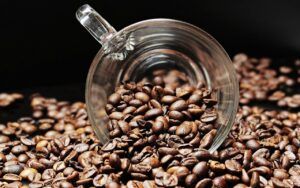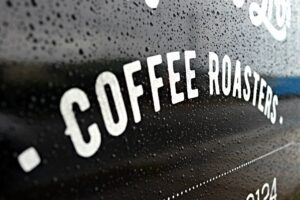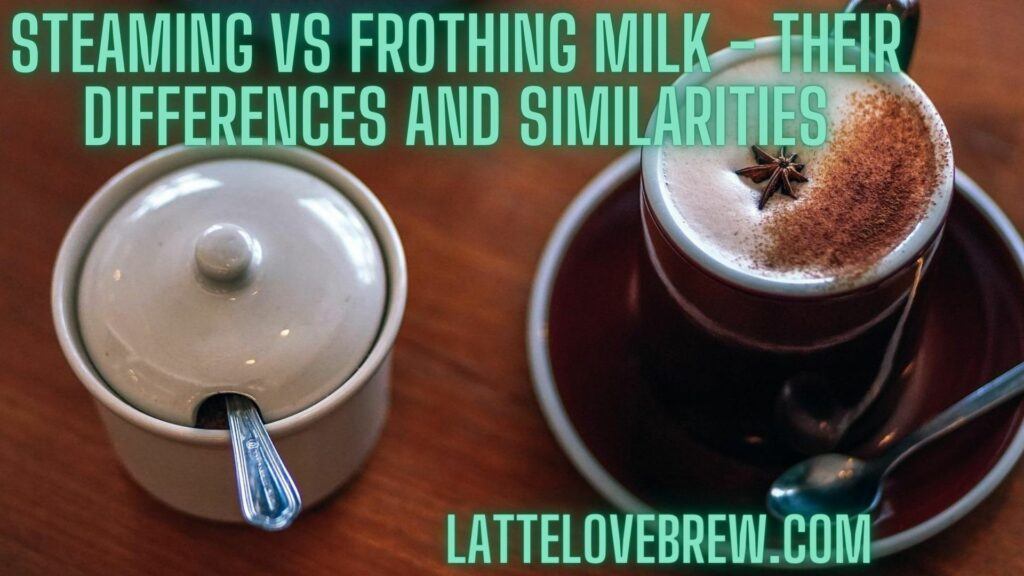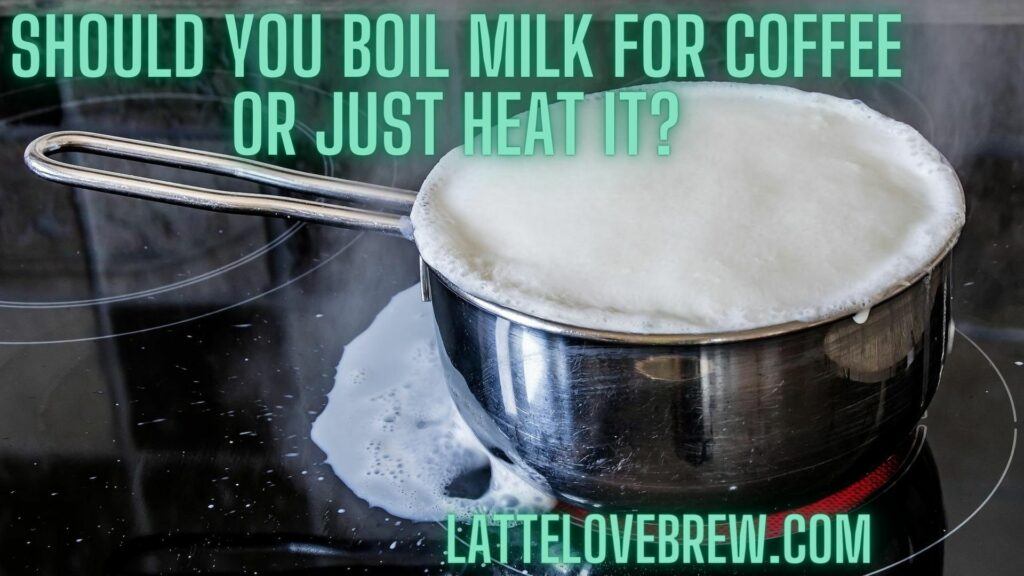Last updated on October 27th, 2023 at 17:32
So, you are an Espresso lover, a coffee lover and just adore using a French press. I bet you are curious if you can have ménage à trois and use espresso beans for a French press. This is exactly what I will address in this article and fully detail espresso beans, using a French Press and how to best make an espresso with your Plunger coffee machine.
French press coffee is by far the best way to brew as it gets the bold coffee flavor out of your exotic coffee beans. This is just one of the many reasons why I, and millions of coffee fans, love to whip up a great brew using this method.
The question remains — Can you use espresso beans for a French press coffee? And the answer is yes…but you can’t make a great espresso.
It is a question of quality. Keep reading to find out if you can match the same quality as an espresso machine.
Espresso Beans For French Press — Can You Use Espresso Beans In A French Press?
Table Of Contents
- 1 Espresso Beans For French Press — Can You Use Espresso Beans In A French Press?
- 1.1 What Makes Espresso Coffee Beans Different From Other Coffee Beans?
- 1.2 Will Espresso Beans In A French Press Coffee Maker Taste The Same As A Regular Espresso?
- 1.3 Is The Grind Size Important For Coffee With A French Press?
- 1.4 Is Water Temperature Important For Making An Espresso With A French Press?
- 2 How To Make Espresso At Home With A French Press
- 3 French Press Espresso Ratio
- 4 Frequently Asked Questions About Beans For French Press
- 4.1 Do You Need Special Beans For French Press?
- 4.2 Can You Use Regular Coffee Beans For French Press?
- 4.3 What Is The Best Ground Coffee To Use In A French Press?
- 4.4 What Happens If You Use Fine Ground Coffee In French Press?
- 4.5 Should You Filter French Press Coffee?
- 4.6 Why Is My French Press Coffee Bitter?
- 4.7 What Kind Of Beans Do You Use For French Press?
- 4.8 How Many Beans Do You Grind For French Press?
- 5 Frappé-ing It All Up Espresso Beans For French Press
Absolutely!
You can use espresso roast coffee beans to make a great French press coffee! There is no doubt that you can make a strong coffee full of flavor by brewing it this way. Unfortunately, to make an espresso and get that rich crema on top is something that you simply cannot achieve with a French press.
This is nothing to do with the quality of the espresso roast beans, or the coffee beans at all. You can use beans that have been hand grown by the Dali Lama himself, but your French press will simply not be able to produce the pressure required to get a great top quality espresso.
At Latte Love Brew we fully encourage you to take control of all the variables in your quest to make amazing coffee. One step very few do is roasting their own beans at home. This is absolutely possible with small home roasters. Give that some good consideration.

Read: How to make plunger coffee with milk
What Makes Espresso Coffee Beans Different From Other Coffee Beans?
An espresso bean is roasted for longer and at a higher finishing temperature than other beans. They are roasted to a little beyond the second crack and thus toasted and hold a deeper flavor than other beans.
This long roasting process removes the acidity and brings some oils to the surface with oils ready to be released and give your coffee a strong distinctive concentrated taste.
Any bean can become an espresso. It is all in the roast, and thus it does not matter if you use arabica bean, robusta, single origin or a mixed blend of beans.
As I suggested earlier, with your own roaster, you can make your own and roast your beans exactly as you like them and can use your best Colombian beans, Tanzanian, Kenyan, Vietnamese, Indonesian or single origin beans or varieties of coffee beans (arabica beans or robusta beans) and roast them to an espresso.

Read: Does French press taste better?
Will Espresso Beans In A French Press Coffee Maker Taste The Same As A Regular Espresso?
If you use espresso beans in your French press coffee maker it will taste like a regular espresso, similar, not better and not the same as and certainly not on the same level as top quality espresso made with really good awesome coffee beans.
The fault lies not with the beans or your talent as barista or that you may be using a low-quality cheap French press. It is due to the machine and its design itself.
The way in which you make an espresso with a French press coffee maker you are missing the key components of a finer grind size and the pressure required to produce the espresso that you are accustomed to from an espresso machine

Is The Grind Size Important For Coffee With A French Press?
Yes,
Brewing coffee with a French press coffee maker you cannot use a very fine espresso grind as you will end up with a very strong bitter tasting coffee that can often end up with a gritty texture that spoils the coffee.
The correct grind size for getting the full flavor from the oils using this brewing method is a coarse grind similar to a sea salt / table salt. This is because the hot water is in contact with the grounds for a longer period of time, typically 4 to 5 minutes.
Similarly to a finer ground, if you go the other way and make a more coarse grind your coffee will become more watery and weak.
For what it is worth and if you are curious, a coarse grind in an espresso machine will not result in a great espresso due to the low contact time the grounds have with the hot water, typically 25 to 30 seconds.
Is Water Temperature Important For Making An Espresso With A French Press?
Yes,
water temperature is always a factor when it comes to brewing coffee, regardless of which brew method that is used. With French press brewing, I suggest that you preheat your carafe, plunger and metal filter by immersing it in near boiling water for about a minute.
The ideal water temperature should be in the 195F to 205F (92C to 96C) temperature range to extract the bold flavors from your coarse ground coffee beans. This is the same temperature range for brewing as an espresso. A much higher temperature range for making an espresso would give you a sour tasting cup of coffee.
If you use a lower water temperature, you end up with a sweeter tasting coffee that is brighter in color.
How To Make Espresso At Home With A French Press
While you can make an espresso at home without an espresso machine, it really has to be said the French press brewing method is by far the least effective I have tried.
The French press method for brewing coffee is just not designed for making an espresso at all. All other coffee types it excelled at brewing, which is probably why it is Starbucks founder Howard Schultz’s preferred way of brewing coffee.
If all you have is a plunger coffee maker, and espresso beans and really want to make an espresso, this is how you can best go about it.
Step 1: Your Grinds
Measure your coffee grinds and put 2 or 3 tablespoons of coarsely ground coffee grounds into the carafe and give it a light shake to even them out.
Step 2: Heat up your water
Boil your water and let it sit for one minute. Then pour a little water into the carafe. Let your grounds bloom for 30 seconds to one minute, then put in about one cup of water, let the water rest for a bit and then stir gently.
Step 3: Let Your Beans Brew
Let your grounds brew for a few minutes, typically 4 mins, and then press down on the plunger slowly. It can help if you lift slightly and then press down on the plunger again and press down slowly again.
This is your espresso basically ready for pouring. Due to the lack of pressure, you will not get crema on top. You can try pouring from a height, but I am not at all confident that you will get much of a result.
French Press Espresso Ratio
The Espresso grounds to water ratio that you should be paying attention to is 2:1, that is 2 tablespoons of coffee per cup of water that you used. Follow this formula, and you should end up with a very good tasting coffee as an end result.
Is There A Special French Press For Making An Espresso?
No,
there is no specific or special French press that you can use for making an espresso coffee. There is not one particular machine of this type that would help you to make a better or more perfect espresso.
There is not one French press coffee maker that is better than the others when it comes to the task of making an espresso.
Are There Different Roasts Of Espresso Beans To Use With A French Press?
To answer this correctly and as best as I possibly can, we need to clarify the question. Can you use different roasts of espresso beans with a French press?
No,
the answer here is no, because an espresso is a roast. All coffee beans can be roasted to an espresso roast, be they single origin, high altitude, Arabica beans or robusta beans.
Can you use different coffee beans, different roasts with the French Press brewing method and machine?
Yes,
you can use any coffee beans in a French press. This method of brewing is one that gives you literally full control of the variables and helps you to easily get the rich flavor profile from your specialty beans.
Frequently Asked Questions About Beans For French Press
Do You Need Special Beans For French Press?
No, it is not an absolute must that you use specialty grade coffee beans for the French press coffee method. You can use any beans that you wish as long as they are medium-dark or dark roast as these roasts work much better with this brewing method.
Can You Use Regular Coffee Beans For French Press?
Yes, ordinary regular coffee beans can be used to make tasty French press coffee. It is not an absolute that they are whole beans; you can use pre-ground coffee beans too.
It is much better that you use whole beans because when you grind your own coffee beans you have an additional freshness factor. The important part is that you coarse coffee grounds to brew your coffee in a French press.
What Is The Best Ground Coffee To Use In A French Press?
For this brewing method, medium-dark to dark roast works best as the full immersion method of brewing that the French press method uses is outstanding at extracting the full flavor from this type of coffee bean.
As a word of warning, don’t use light roasts to make a French press coffee as you will struggle to extract the flavors and get a great coffee with this method.
What Happens If You Use Fine Ground Coffee In French Press?
When you use fine ground coffee in a French press you will end up with a cup of coffee that is very bitter, too bitter to drink.
You will also have a difficult time in pushing down on the plunger as the filter will get clogged with the coffee grinds and effectively speaking turning your plunger into a piston that is pushing down on the water.
Should You Filter French Press Coffee?
Yes, you need to use a filter to make an amazing and outstanding coffee. Thankfully there is a built-in stainless steel filter. There is no need at all for you to use a paper filter.
Why Is My French Press Coffee Bitter?
If your French press coffee is bitter, the likely cause is over extraction. To find out why your coffee is over extracted start by focusing on the variables that you can adjust.
The most common reasons are:
- The water temperature was too hot.
- Your grind size was too small.
- Your brewing time was too long.
Make one change at a time.
What Kind Of Beans Do You Use For French Press?
Premium quality freshly roasted medium to dark roast coffee beans are perfect for making French press coffee. Darker roasts work better with this brewing technique if you like to add milk and sugar to your coffee.
How Many Beans Do You Grind For French Press?
It’s not a number of coffee beans to grind but a ratio of the coffee to water. A good ratio for a strong cup of French press coffee is to use a coffee to water ratio of 1:12. For a 12 ounce (360 ml) cup of coffee, use 12 ounces (360 ml) of hot water and 1 ounce (30 grams) of coarsely ground coffee.
Frappé-ing It All Up Espresso Beans For French Press
You can absolutely use espresso beans for a French press and can make an espresso with your French press, but don’t expect to be making an excellent or top quality espresso with it. Just because you can, it does not mean that you should!
The French press holds the pride place in my coffee making equipment at home and I use it with my best beans as I want and like to get the best, and fill intense flavor out of them and a few methods of brewing are better than the French press.
Just don’t bank on getting a great espresso out of your espresso beans with a French press!
What beans did you use in your French press?
How did your coffee taste?
Join our online coffee community on Facebook/Meta and share your coffee creations, ideas, recipes and coffee morning selfies.







